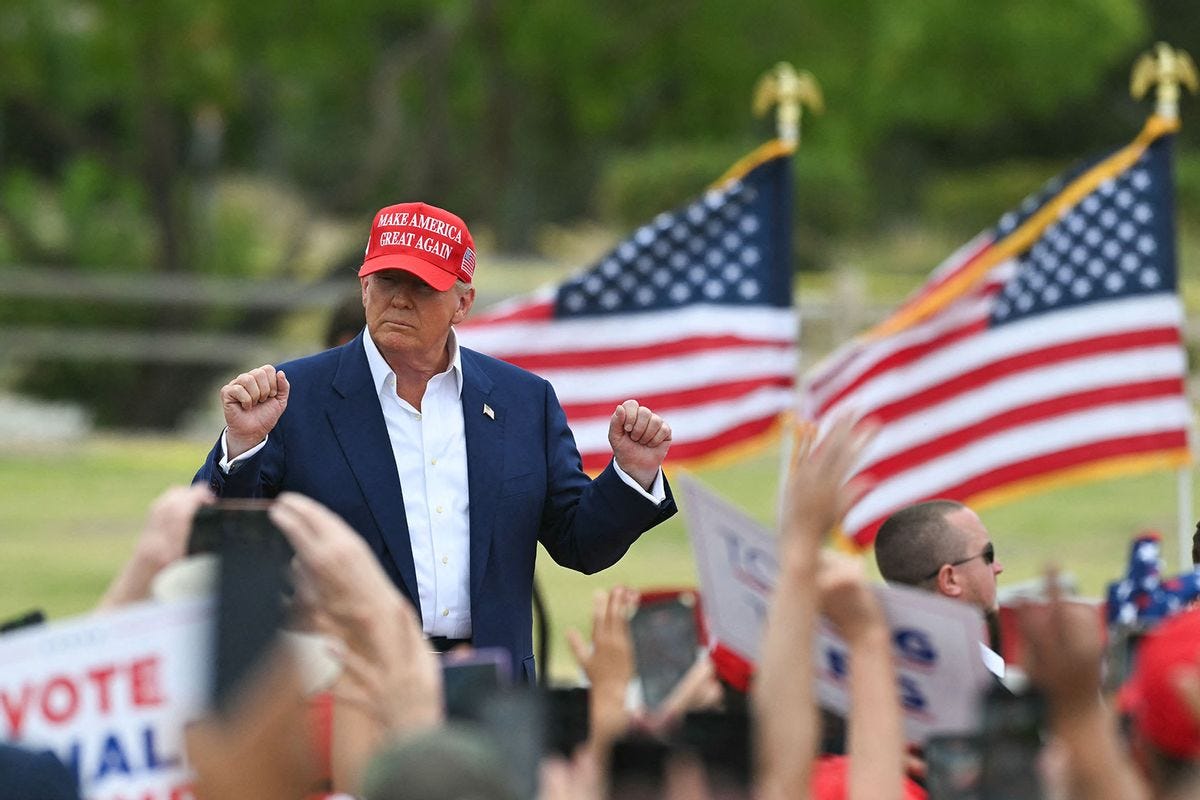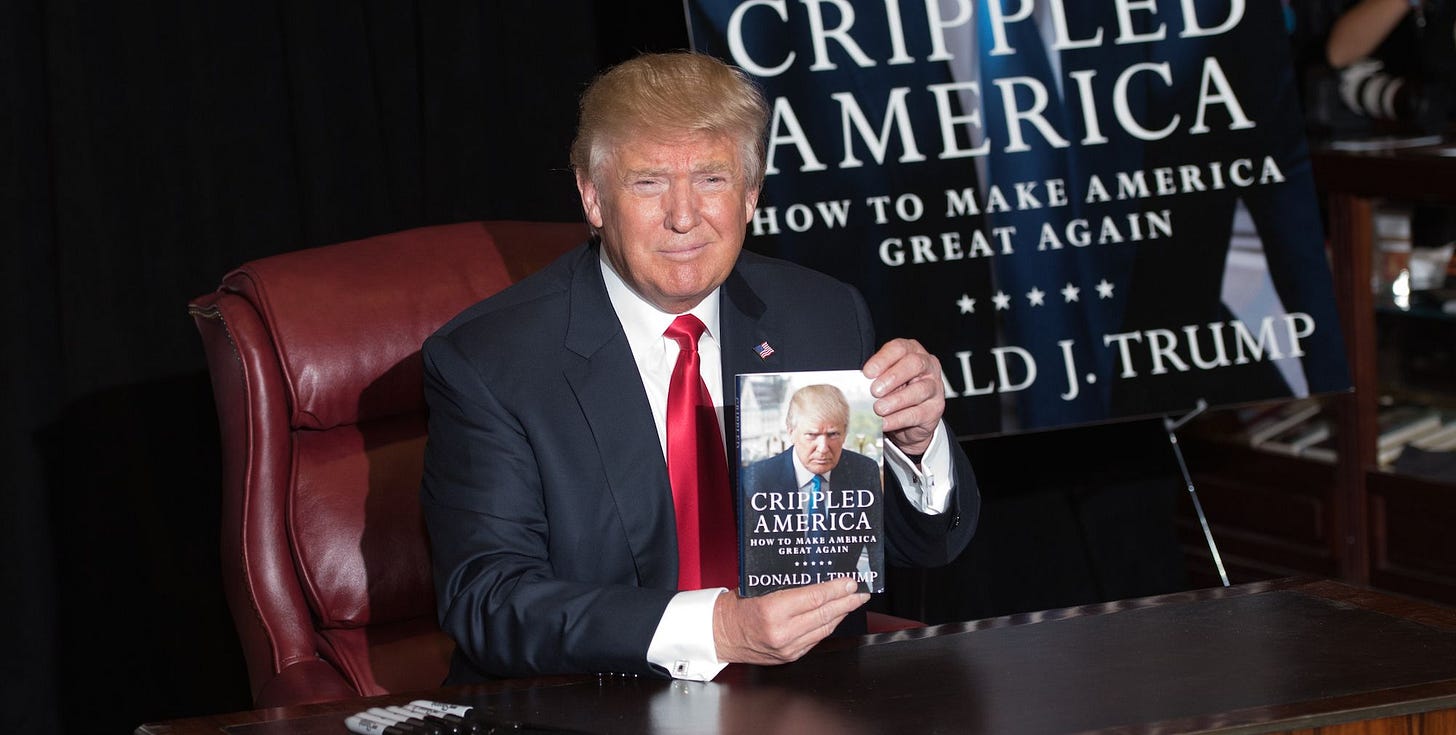The thought processes of Donald Trump
The Republican presidential candidate has been making some startlingly surreal public utterances recently, which make me wonder how his mind works
Let me start with a disclaimer: this is no kind of amateur psychological analysis of Donald Trump. Firstly, I have no training in mental health, whereas my father had and my stepmother and sister do, so I know what the real thing looks like. I can offer nothing but anecdotal observations based on my own experience and thoughts. Evene if I had such training, I still believe in the idea of the Goldwater Rule, eventually Section 7 of the American Psychiatric Association’s Principles of Medical Ethics, which makes it clear that clinicians should not attempt to diagnose public figure whom they have not met or examined, and who have therefore had no opportunity to grant or withhold consent. The APA calls it unethical and I agree.
I do want to make a few observations about the way Donald Trump speaks in public, especially when he is addressing large crowds. My argument really is twofold: firstly, the content of what he says is often very strikingly weird, to the verge of nonsensical, although his supporters seem very happy to overlook this; and secondly, insofar as I can tell as a layman on the outside, his attention span, at least when it is turned towards the words he is uttering, is extraordinarily short.
I was prompted to formalise these thoughts by two articles in The Atlantic, “Trump Rants About Sharks, and Everyone Just Pretends It’s Normal” by Brian Klaas and “Let’s Talk About Trump’s Gibberish” by Tom Nichols. Both were published on Wednesday 12 June, and both referred to a speech Trump gave in Las Vegas on Sunday 9 June. It was his first campaign event since being convicted on 34 felony charges in New York, and the rally was held in searing heat, at one point above 105℃. At one point, the teleprompter he was using broke down.
All of these are fair elements of mitigation. Trump turns 78 tomorrow (14 June), he takes very little exercise because he believes (wrongly) that the human body has a finite amount of energy which should not be squandered, and the weather was exceptionally hot. When the teleprompter failed, he was required to speak impromptu, which is a particular skill not everyone possesses, and we can give him a lot of leeway if his remarks were not as tightly crafted or concise as they could have been. Nevertheless, what followed was simply surreal.
He had been talking about his pledge to scrap President Biden’s policies to encourage to sale of electric vehicles, especially the emissions limits on cars and light trucks. Trump is a strong supporter and financial beneficiary of the oil industry and believes that climate change is a hoax. Nevertheless, his attempt to ad lib remarks on EVs is so strange it is worth quoting at length.
I say, ‘What would happen if the boat sank from its weight, and you’re in the boat, and you have this tremendously powerful battery, and the battery’s now underwater, and there’s a shark that’s approximately 10 yards over there?’
By the way, a lot of shark attacks lately, do you notice that? Lot of sharks. I watched some guys justifying it today: ‘Well they weren’t really that angry, they bit off the young lady’s leg because of the fact that they were not hungry but they misunderstood who she was.’ These people are crazy. He said, ‘There’s no problem with sharks, they just didn’t really understand a young woman swimming.’ No, really got decimated, and other people, too, a lot of shark attacks.
So I said, ‘There’s a shark 10 yards away from the boat, 10 yards, or here. Do I get electrocuted if the boat is sinking, water goes over the battery, the boat is sinking? Do I stay on top of the boat and get electrocuted, or do I jump over by the shark and not get electrocuted?’ Because I will tell you, he didn’t know the answer.
He said, ‘You know, nobody’s ever asked me this question,’ and it must be because of MIT, my relationship to MIT. Very smart. I said, ‘I think it’s a good question. I think there’s a lot of electric current coming through that water.’ But you know what I’d do if there was a shark or you get electrocuted? I’ll take electrocution every single time. I’m not getting near the shark. So we’re going to end that, we’re going to end it for boats, we’re going to end it for trucks.
Take your time. One or two observations: that weird disquisition was prompted by the thought of batteries in electric vehicles but quickly and mysteriously invoked sharks. If you shared the former president’s concern about electrocution, a high-capacity battery would discharged very quickly in seawater, which does, in any event, conduct electricity much more efficiently than human beings do. As for the weight of the battery sinking the boat, well, you will conclude fairly rapidly that that’s not how buoyancy works. Or boats.
That reference to MIT, the Massachusetts Institute of Technology, is interesting. His “relationship” to the prestigious seat of learning and research is represented by his uncle, John G. Trump, an electrical engineer and physicist who was assistant professor from 1936 to 1952 then professor from 1952 to 1973 of electrical engineering. Professor Trump was a very distinguished scientist and researcher. His nephew is not. And he retired when Donald Trump was 27 years old. It is therefore not clear why the former president invokes his uncle’s scientific prowess, although in 2015 he told CNN that his uncle had been a “genius”, going on to say “It’s my blood. I’m smart. Great marks. Like really smart.”
The riff on sharks, boats and batteries is not an isolated incident. At a rally in New Jersey in May, he unexpectedly began a series of observations about Dr Hannibal Lecter, protagonist of Thomas Harris’s novels and the 1992 film Silence of the Lambs. Again, it is worth quoting Trump at length.
‘Silence of the Lamb. ’Has anyone ever seen ‘The Silence of the Lambs’? The late, great Hannibal Lecter is a wonderful man. He oftentimes would have a friend for dinner. Remember the last scene? ‘Excuse me, I’m about to have a friend for dinner’ as this poor doctor walked by. ‘I’m about to have a friend for dinner.’ But Hannibal Lecter, congratulations. The late, great Hannibal Lecter.
The context of this unusual passage was an accusation that the government is “emptying out their mental institutions into the United States, our beautiful country”. He had offered the insight that “an insane asylum is a mental institution on steroids”.
In case you think those are both isolated incidents, let me offer as a third example some remarks the former president made at an event in Pennsylvania in April.
Gettysburg, what an unbelievable battle that was. The Battle of Gettysburg. What an unbelievable―I mean, it was so much and so interesting, and so vicious and horrible, and so beautiful in so many different ways. The statement of Robert E. Lee―who’s no longer in favour, did you ever notice that? No longer in favour―‘Never fight uphill, me boys, never fight uphill.’ They were fighting uphill. He said, ‘Wow, that was a big mistake.’ He lost his great general, and they were fighting. ‘Never fight uphill, me boys!’ But it was too late.
It is impossible to say why the Battle of Gettysburg popped into his head at this point, though his mastery of its detail seems lacking.
Let’s be honest, all three of these passages are surreal, disjointed, almost-meaningless rants. If one could distill a meaning, it would be inaccurate, though I have no reason to think any of his words were planned more than a few seconds before they left his mouth. He was essentially free-associating, sliding from one topic to another, and because the devoted crowds kept cheering, he kept going.
This connects closely to my second point, which is that Donald Trump seems, to judge from his public utterances, to have an incredibly short attention span. You see this in the fact that, unless he is speaking from a formal script, he doesn’t really use sentences so much as clauses or phrases loosely tied together. To illustrate this, look at a press conference he gave in May, after the judge had instructed the jury before its deliberation in his felony case. First he was asked how he felt about the jury.
I would say in listening to the charges from the judge, who’s as you know, very conflicted and corrupt, because of the confliction, very, very corrupt. Mother Teresa could not beat these charges. These charges are rigged. The whole thing is rigged. The whole country’s a mess between the borders and fake elections, and you have a trial like this where the judge is so conflicted, he can’t breathe. He’s got to do his job, and it’s not for me, that I can tell you. It’s a disgrace. And I mean that. Mother Teresa could not beat those charges, but we’ll see. We’ll see how we do. It’s a very disgraceful situation. Every single legal scholar and expert said this is no case. It shouldn’t be brought. And it certainly could have been brought seven years ago, not in the middle of a presidential election.
There’s a vast amount of repetition in there: “conflicted and corrupt, because of the confliction, very, very corrupt”; “Mother Teresa could not beat these charges… Mother Teresa could not beat these charges”; “rigged… rigged”; “we’ll see, we’ll see how we do”. Some of it is for effect, to make his points stick, like the idea that the trial is so rigged that Mother Teresa, as an acme of virtue and propriety, would be found guilty. Some of it is simply verbal filler.
Trump then turned his attention to President Biden, because it is his relentless tactic not only to declare his own innocence but also the profound guilt and perfidy of his opponents. It is as if he must present to greatest possible contrast, so he is a pure and assailed martyr while Biden and others are in league with the darkest of forces (he said that Judge Merchan was “really a devil”).
For Joe Biden, the worst president in the history of the United States, he’s destroying our country. He’s letting millions of people from jails, from prisons, from insane asylums, from mental institutions, drug dealers, pour in. Venezuela, if you look at their crime statistics, they’ve gone down 72% in crime because they’re releasing all their criminals into our country because of this horrible president that we have. And then they have a protest with Robert De Niro yesterday. He’s a fool. He’s a broken-down fool standing out there. And he got MAGA’d. He got MAGA’d yesterday. He got a big dose of it.
This is a bumpy oratorical ride. We start with the idea that Biden is the worst president ever. Then we veer to Venezuela as a kind of warning of what might become of America, before switching to Robert De Niro, who had made a public statement attacking Trump the previous day but was shouted down by Trump supporters. It could be that this a carefully planned narrative progression, but to believe that would be to put an enormous amount of faith in Trump’s mental acuity (but then he did describe himself as “a very stable genius”).
A more realistic interpretation, I suggest, is that he lurches from thought to thought largely by instinct, circulating between a favoured selection of tropes: his own brilliance, the incompetence and villainy of his opponents, the extent to which the establishment is ranged against him, the loyalty of his disciples, the glory of an inevitable second term as president, the fact that it is merely repayment for an opportunity stolen from him in 2020. His navigation is aided by wild hyperbole, both positive and negative, and a characteristic he shares with Boris Johnson, a shameless indifference to whether something is true or not.
One last example. In May Trump spoke at the annual meeting of the National Rifle Association in Dallas. This short passage from his opening remarks show ludicrous, slightly childlike hyperbole, very loosely connected thoughts and a habit which is peculiar to Trump: of coming upon a metaphor or piece of imagery, almost by accident, but liking it and embracing it.
It’s a true honour to be here today to receive the endorsement of the proud American patriots at the NRA. These are great patriots. These are great people, and we’re going to do things like nobody can believe. We’re going to win this election at levels that nobody’s ever seen before. Thank you very much for that endorsement. It means a lot to me. When I started off, as you know, in 2016, I got that endorsement early, and I got it. Some people thought they had it made, but we got it. We got it again, and we’ve lived up to everything, as you know, everything I said. We’re under siege with the guns, the rifles, and everything else. We’re under siege. But they didn’t move us an inch, and we have to stand strong. You know that we have to stand very strong.
I could keep citing the former president’s public appearances but I think I’ve illustrated what I’m trying to show as best I can. Not everyone speaks in carefully crafted and polished prose, especially when speaking off the cuff, and a degree of syntactic fuzziness is not a surefire indicator of stupidity or senility. Donald Trump, however, is a more extreme case than that.
He has some tremendous advantages as a public figure and as a speaker. He has ironclad self-confidence and therefore never hesitates out of uncertainty or anxiety, nor does he worry about sounding absurd or disjointed. Allied to that he has an absolute indifference to the the truth, which allows him to say things which are manifestly and provably false, without being in any way worried about contradiction or embarrassment. This is a difficult tactic to match: if someone insists beyond contradiction that what they are saying is true, even if you show them that it is not, it is difficult to know what to do next.
The overriding impression I get, however, is of someone who launches with confidence into a sentence and will essentially keep talking until he is stopped or runs out of time. He is, however, propelled in a weird, teetering way by momentum, like an unsteady cyclist, with only forward motion preventing an undignified collapse. That leads him to lean on filler words and repetition, and it also causes a progression from subject to subject which can seem—and often is—lurching, sudden and random. Despite this profound oddness, which is not quite inarticulacy but is a strikingly simplistic way of communicating, when he is in front of a supportive crowd, he is cheered to the rafters.
As I said when I began, I am simply not qualified to say that these aspects of Trump’s communication style are proof of this or that cognitive problem. If I were qualified, I would not do it, as I also explained. I do think people who dismiss Trump as stupid have misjudged him: there is clearly an extent to which he is clever and cunning. I do think he is intellectually unsophisticated, poorly informed and essentially incurious. He claims that the Bible is his favourite book, though he has also previously cited All Quiet on the Western Front, but when he was asked in 2016 he named as his favourite two books of his own, The Art of the Deal and Surviving at the Top. But he betrays no sense of an internal intellectual landscape of any sophistication, let alone a hinterland. Everything is very immediate.
In former times, Donald Trump would surely have been a fringe figure, a successful businessman with self-interested presidential ambitions but one who was far too odd, crude and lacking in depth to be a serious proposition, someone like Herman Cain or John Cox. The extraordinary circumstances of the mid-2010s changed the calculus sufficiently to allow Trump not only to win the Republican Party’s nomination but also the presidency. There is every reason to think he may well have a second term in the White House from 2025 to 2029. But I still do wonder what goes on inside his head, because the outward product is strikingly weird.








I kept chuckling while reading your article, in a good-natured way. When Donald Trump ran for office in 2016, it took me a while to appreciate his irrepressibility. I think part of his personality/thinking is to take in a lot of impressions and then to connect them to what he cares deeply about - safety, freedom, love of country, people making the most of their life, etc. When he speaks in an unplanned way, in front of a friendly crowd, he would express these internal connections in a not well-thought-out way. [I don't think knowledge of science is one of his strengths.] I think strengths can come with weaknesses - ex. action-oriented people struggling with contemplation perhaps and contemplative people struggling with being decisive and acting. Ronald Reagan might be an example of having a good balance - contemplative and action-oriented. I'm not a psychologist either, but it's natural to try to understand people and oneself better.
You never know death or crippling medical condition may yet save us. One wonders who his V.P. might be, considering his age, obesity and health regime. He can do no wrong in the eyes of his followers.